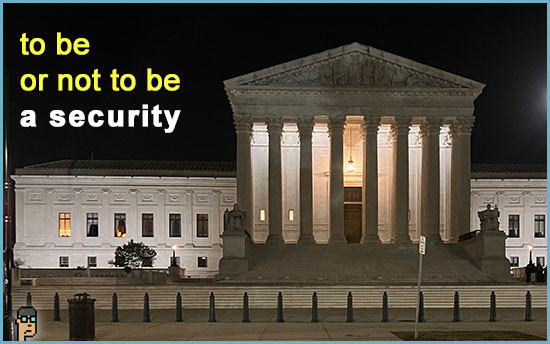Do Kwon ruling
Another court ruling, more rough waters for digital assets. The Wall Street Journal reported Monday that algorithmic stablecoin creator Do Kwon of Terraform Labs did not convince Judge Jed Rakoff of dismissing the Securities and Exchange Commission’s (SEC) enforcement action against him using the recent Ripple/XRP outcome penned by Judge Analisa Torres.
Read the ruling (PDF) on CourtListener.
Judge Rakoff said he disagreed with Torres’ decision and wrote that securities laws do not make the distinctions between institutional and retail investors that Torres identified in her decision two weeks ago. Rakoff said that “secondary-market buyers have the same expectations for an investment as initial purchasers,” according to The WSJ. Read more.
Do Kwon ruling – reaction
Brown Rudnick crypto lawyer Stephen Palley commented on Twitter about Rakoff’s decision saying, “A big [difference] between Rakoff & Torres decisions is that the former was on a motion to dismiss & the latter on summary judgment. Motions to dismiss focus on if plaintiff has stated a cognizable claim in the pleadings. Summary judgment looks outside the pleading, at evidence.” Read Palley’s thread.
Attorney James Murphy (known as @MetaLawMan on Twitter) tweeted, “Judge Rakoff ruled that sales of UST ‘stablecoins’ were investment contracts (purchased with the expectation of profits) because: 1) UST could be “converted to LUNA coins” & 2) UST could be staked on the Anchor Protocol and generate yield. Under this reasoning, any medium of exchange could be an investment contract because it could be traded for something else that might generate a profit. Not logical imo. ”
Willkie Farr counsel Mike Selig offered his take in a Tweet thread beginning with “Judge Rakoff’s decision on Terraform’s motion to dismiss in SEC v. Terraform Labs isn’t exactly the win the SEC wanted. Judge Rakoff agreed with Judge Torres that crypto assets, in and of themselves, are not investment contracts. Bad for the SEC.” Read the whole thread.
And Crypto Council’s GC and Global Head of Policy Ji Kim offered a tweet thread saying, “There’s been a lot of commentary regarding J. Rakoff’s opinion in Terra, but there is nothing in there that contradicts J. Torres’ ruling in Ripple that the investment contract is the security, NOT the underlying crypto asset.” Read the thread.
Bitcoin and ESG
A new Bitcoin mining study by professional services firm KPMG argues that Bitcoin mining is aiding the themes of today’s ESG (environmental, social, and governance) investors. Visit KPMG’s site.
Among the themes are the use of renewable energy, “demand response,” recycled heat, methane reduction and positive social impact such as the enablement of worldwide instant payments. Read more detail by downloading the report (PDF).
h/t @CodyCarboneDC
DeSantis defends crypto
Perhaps drawing from the House Republican agenda, Presidential candidate Governor Ron DeSantis (R, FL) announced to a New Hampshire campaign stop crowd on Monday, “Biden’s war on bitcoin and cryptocurrency will come to an end when I am president.”
Forbes reports the Florida governor’s brief discussion on digital assets was part of a broader speech on his vision for economic policy and represents another area where he and former President Donald Trump differ. DeSantis added bluntly, “We are going to allow Americans to invest in things like bitcoin and cryptocurrency.” Read more.
use case – cultural artifacts
A new service created by a computer scientist and archaeologist in Abu Dhabi and London, respectively, enables the use of blockchain technology to keep track of the provenance of cultural treasures. Cointelegraph explains, “Called Salsal, the big idea behind the service is to bridge the world of historical artifacts with an on-chain validation system that can’t be fudged or cloned.” Read more.
Adel Khelifi, the computer scientist, tells CNN of one specific use case: “We use the Museums Association certification process where you rate objects on a one to five scale (based on) how secure or how valid a collection is.” Read that one.
see more tips
Franklin Templeton plans blockchain money market funds on Avalanche, Aptos, Arbitrum – Ledger Insights
German data watchdog probing Worldcoin crypto project, official says – Reuters
Putin Outlaws Anonymity: Identity Verification For Online Services, VPN Bypass Advice a Crime – TorrentFreak

